2018年中考英语知识归纳复习专题代词外研版20200505112
- 格式:doc
- 大小:80.50 KB
- 文档页数:12
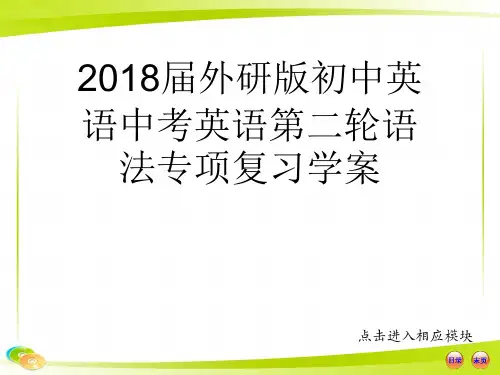

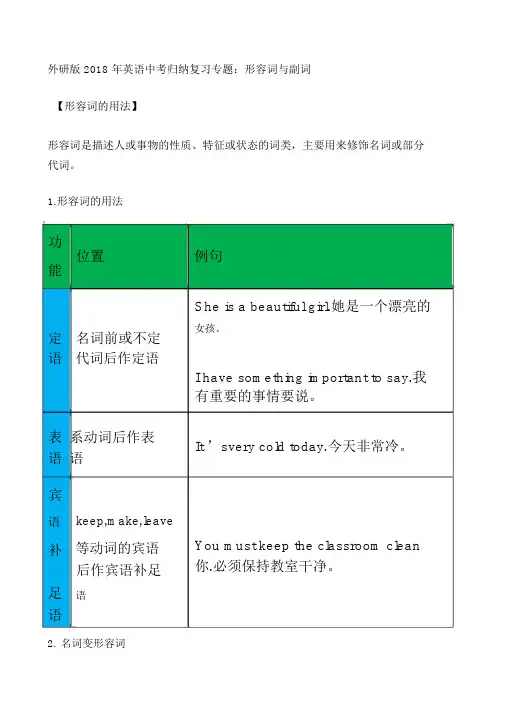
外研版 2018 年英语中考归纳复习专题:形容词与副词【形容词的用法】形容词是描述人或事物的性质、特征或状态的词类,主要用来修饰名词或部分代词。
1.形容词的用法功位置例句能She is a beautiful girl.她是一个漂亮的定名词前或不定女孩。
语代词后作定语I have something important to say.我有重要的事情要说。
表系动词后作表语语宾语keep,make,leave补等动词的宾语后作宾语补足足语语It ’s very cold today.今天非常冷。
You must keep the classroom clean 你.必须保持教室干净。
2.名词变形容词名构成方法意表示天气的充⋯⋯的-y名多⋯⋯的表示方位的⋯⋯方位的-ern名朝⋯⋯方的表示称的-Ly⋯⋯般的名表示的-ly每⋯⋯的名表示物的⋯⋯制成的-en/-y名⋯⋯般的例cloud-cloudy sun-sunny west-western south-southern friend-friendly week-weekly day-daily wood-wooden sand-sandy⋯⋯的-ful有⋯⋯的表示情感的名-y⋯⋯的不⋯⋯的-less无⋯⋯的表示大洲与⋯⋯的-n国家的名⋯⋯人的要点提醒:care-careful beauty-beautiful luck-luckyhealth-home-homeless hope-hopelessAmerica-American Russia-Russian如:a nice large square old brown wooden table一张又大又漂亮的古老的棕色方木桌2. ed ing 形容词(考点讲解详见P8 考点 3)3.在英语中有些形容词通常只用作表语,不可作(前置)定语。
这类形容词主要有:①表示健康状况的形容词,如 ill,well;②以 a 开头的表状态的形容词,如:afraid,asleep,awake 等。
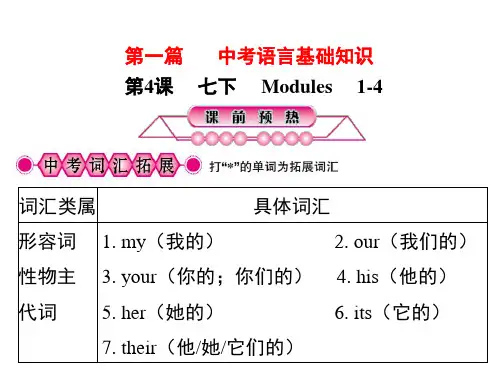
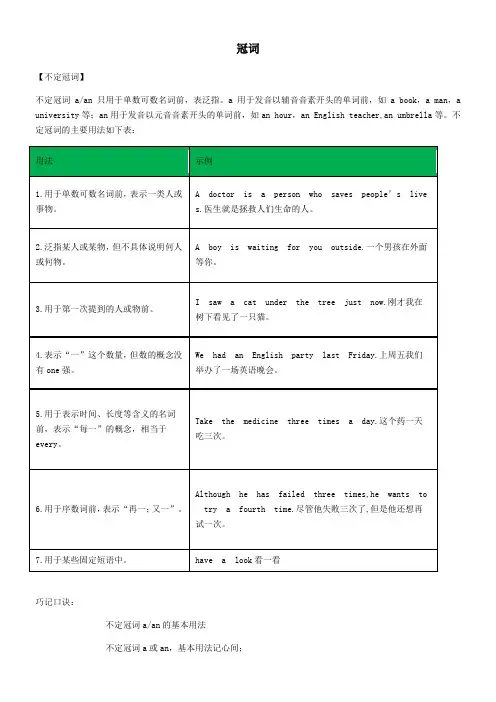
冠词【不定冠词】不定冠词a/an只用于单数可数名词前,表泛指。
a用于发音以辅音音素开头的单词前,如a book,a man,a university等;an用于发音以元音音素开头的单词前,如an hour,an English teacher,an umbrella等。
不定冠词的主要用法如下表:巧记口诀:不定冠词a/an的基本用法不定冠词a或an,基本用法记心间;辅音音素前用a,元音音素前用an;人或事物首次提,泛指某人或某物;单位时间表每一,序数词前表又一;固定搭配心中记。
【考点训练1】用适当的冠词填空。
1.—What do you want to be when you grow up?—I want to be _____ engineer.2.The family had __ good time in Shanghai Disneyland.3.I’m reading ___ novel.It is ___ interesting story.4. ____ apple a day keeps the doctor away.an a a an An【定冠词】定冠词在单、复数名词,可数名词和不可数名词前均可使用,表特指。
定冠词的主要用法如下表:巧记口诀:定冠词the的基本用法特指双熟悉,上文已提及;序数最高级,乐器姓氏复数前;世独形前一类人,特殊用法特殊记。
【考点训练2】1.—Do you know ___ boy over there?—Yes,he likes playing violin very much. ()A.the;/B.a;theC.the;theD.a;/2.—Would you please turn off ___ TV?—OK,just a minute. ()A.aB.anC.theD./3.She went to a European university to study art.____ university is really amazing. ()A.AnB.TheC.AD./【零冠词】英语中在一些场合下名词前面是不需要冠词的,这种现象可称做“零冠词”。
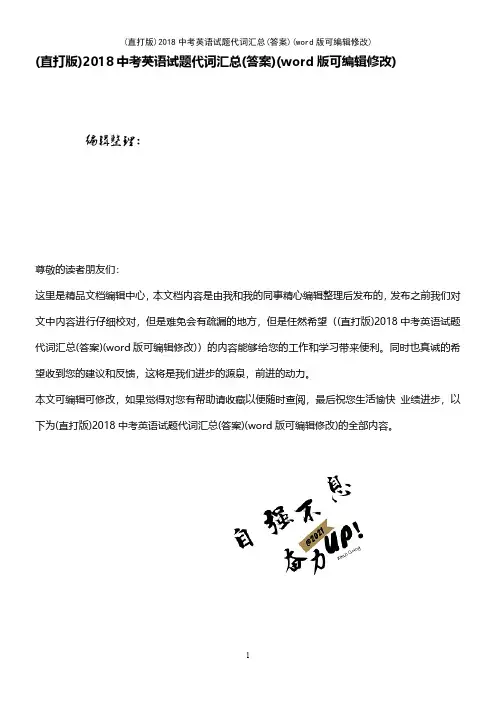
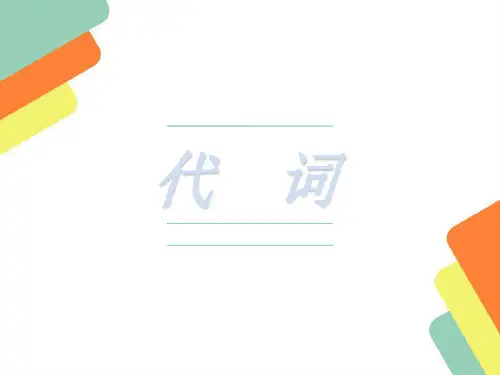
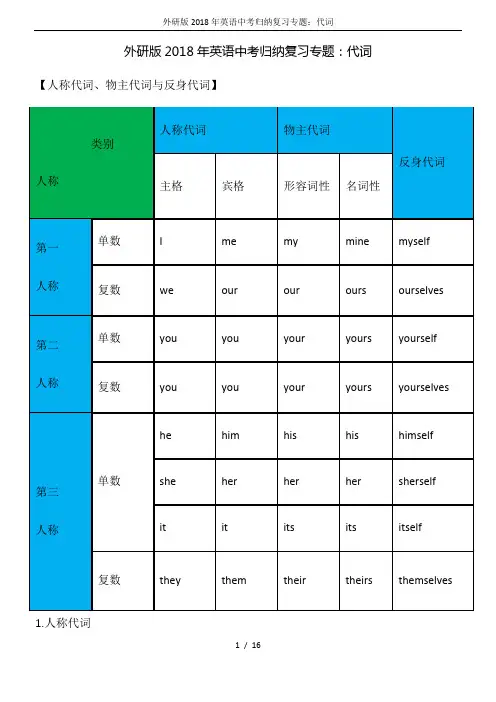
外研版2018年英语中考归纳复习专题:代词【人称代词、物主代词与反身代词】1.人称代词人称代词有人称、数和格的变化,有主格和宾格之分。
通常主格用作主语,宾格用作宾语或表语。
(1)主格通常用在动词前作主语。
如:I like apples.我喜欢苹果。
(2)宾格通常用在动词或介词后作宾语。
如:He often helps me learn English.他经常帮助我学习英语。
(动词后作宾语)My younger brother is ill.We’re worried about him.我弟弟生病了,我们很担心他。
(介词后作宾语)2.物主代词物主代词表示所属关系,分为形容词性物主代词和名词性物主代词,有人称和数之分。
形容词性物主代词具有形容词的功能,不能单独使用,用在名词前作限定词。
名词性物主代词具有名词的特征,其后不跟名词,名词性物主代词=形容词性物主代词+名词。
如:This pen is mine.(=This is my pen.)这支钢笔是我的。
3.反身代词反身代词表示“某人自己”的意思,是人称代词的强调形式,一般用在宾语和主语是同一人的情况下,或用来强调某人亲自做某事。
其变化规则为:self,selves。
一般用作动词或介词的宾语。
反身代词的常见搭配: enjoy oneself 玩得开心;过得愉快teach oneself=learn...by oneself 自学by oneself=alone 独自hurt oneself 伤着自己help oneself to sth.随便吃点东西look after oneself 照顾自己leave sb.by oneself 把某人单独留下dress oneself 自己穿衣服lose oneself in陶醉于……;沉浸于……【考点训练1】1.I think it’s important for children to help _____ (they) parents with housework.2.Don’t worry about____.I’m old enough to look after ______.(I)3.____ (we) computers are new,but _____ (they) are old.4.I have a cat and ___ name is Mimi. ()A.its’B.it’sC.itD.itsTheir me myself Our theirs D【不定代词】不明确指代某个(些)人、某个(些)事物而起名词或形容词作用的代词叫做不定代词。
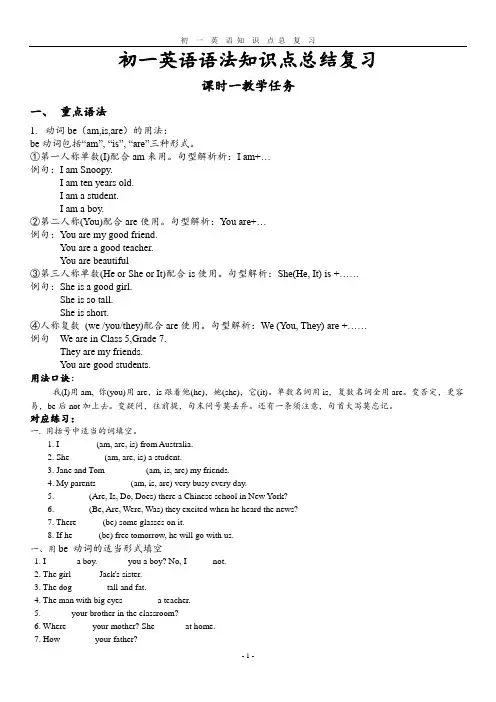
初一英语语法知识点总结复习课时一教学任务一、重点语法1.动词be(am,is,are)的用法:be动词包括“am”, “is”, “are”三种形式。
①第一人称单数(I)配合am来用。
句型解析析:I am+…例句:I am Snoopy.I am ten years old.I am a student.I am a boy.②第二人称(You)配合are使用。
句型解析:You are+…例句:You are my good friend.You are a good teacher.You are beautiful③第三人称单数(He or She or It)配合is使用。
句型解析:She(He, It) is +……例句:She is a good girl.She is so tall.She is short.④人称复数(we /you/they)配合are使用。
句型解析:We (You, They) are +……例句We are in Class 5,Grade 7.They are my friends.You are good students.用法口诀:我(I)用am, 你(you)用are,is跟着他(he),她(she),它(it)。
单数名词用is,复数名词全用are。
变否定,更容易,be后not加上去。
变疑问,往前提,句末问号莫丢弃。
还有一条须注意,句首大写莫忘记。
对应练习:一. 用括号中适当的词填空。
1. I ________(am, are, is) from Australia.2. She _______ (am, are, is) a student.3. Jane and Tom _________(am, is, are) my friends.4. My parents _______ (am, is, are) very busy every day.5. _______ (Are, Is, Do, Does) there a Chinese school in New York?6. _______ (Be, Are, Were, Was) they excited when he heard the news?7. There _____ (be) some glasses on it.8. If he _____ (be) free tomorrow, he will go with us.一、用be 动词的适当形式填空1. I ______ a boy. ______ you a boy? No, I _____ not.2. The girl______ Jack's sister.3. The dog _______ tall and fat.4. The man with big eyes _______ a teacher.5. ______ your brother in the classroom?6. Where _____ your mother? She ______ at home.7. How _______ your father?8. Mike and Liu Tao ______ at school.9. Whose dress ______ this?10. Whose socks ______ they?11. That ______ my red skirt.12. Who ______ I?13.The jeans ______ on the desk.14.Here ______ a scarf for you.15. Here ______ some sweaters for you.16. The black gloves ______ for Su Yang.17. This pair of gloves ______ for Yang Ling.18. The two cups of milk _____ for me.19. Some tea ______ in the glass.20. Gao shan's shirt _______ over there.第二课时(1)英语人称代词和物主代词一、人称代词表示“我”、“你”、“他”、“她”、“它”、“我们”、“你们”、“他们”的词,叫做人称代词。
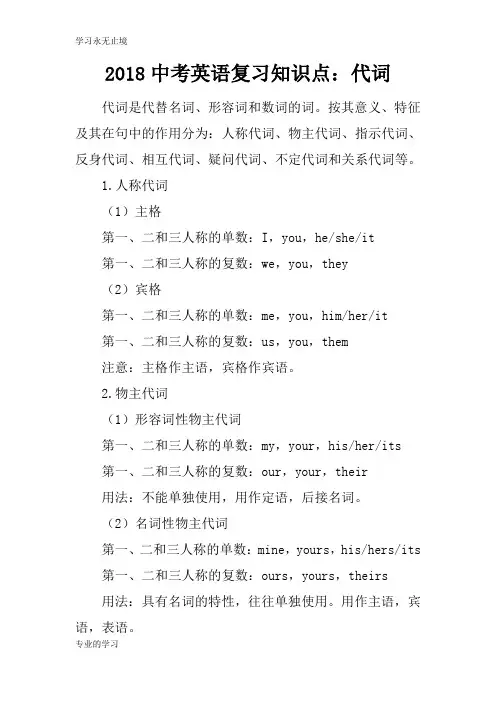
2018中考英语复习知识点:代词代词是代替名词、形容词和数词的词。
按其意义、特征及其在句中的作用分为:人称代词、物主代词、指示代词、反身代词、相互代词、疑问代词、不定代词和关系代词等。
1.人称代词(1)主格第一、二和三人称的单数:I,you,he/she/it第一、二和三人称的复数:we,you,they(2)宾格第一、二和三人称的单数:me,you,him/her/it第一、二和三人称的复数:us,you,them注意:主格作主语,宾格作宾语。
2.物主代词(1)形容词性物主代词第一、二和三人称的单数:my,your,his/her/its第一、二和三人称的复数:our,your,their用法:不能单独使用,用作定语,后接名词。
(2)名词性物主代词第一、二和三人称的单数:mine,yours,his/hers/its 第一、二和三人称的复数:ours,yours,theirs用法:具有名词的特性,往往单独使用。
用作主语,宾语,表语。
例如:Thisroomismine,yoursisupstairs,andtheirsarenexttohers.(这个房间是我的,你的在楼上,他们的在她的隔壁。
)注意:形容词性物主代词+名词相当于一个名词性物主代词。
例如:Thisismypen.(这是我的笔。
)=Thispenismine.(这个笔是我的。
)3.反身代词英语中用来表示“我自己”,“你自己”,“他自己”,“我们自己”,“你们自己”等意义的代词称为反身代词。
反身代词第一、二和三人称的单数:myself,yourself,herself/himself/itself反身代词第一、二和三人称的复数:ourselves,yourselves,themselves反身代词可以在句中作宾语,表语,主语的同位语和宾语的同位语。
(1)作宾语,表示动作的承受者就是动作的发出者,主语和宾语指同一个人或一些人。
例如:Hecalledhimselfawriter.(他称呼自己为作家。
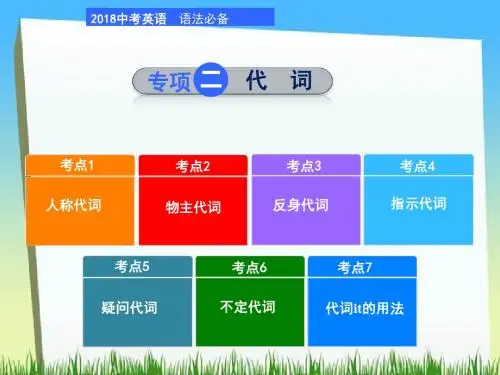
外研版英语中考英语代词知识点(大全)一、初中英语代词1.Mary's answer is different from, but I really agree with.A. his; herB. his, hersC. him; hersD. him; her【答案】A【解析】【分析】句意:玛丽的回答和他的不同,但我真的同意她。
be different from, 与……不同,因主语是Mary's answer,后面要用名词性物主代词his;agree with sb,赞同某人的观点或看法,主语是I, sb要用人称代词的宾格,her,故选A。
【点评】考查物主代词与人称代词的基本用法。
2.Jack couldn't buy the gift because there was very money left in his pocket.A. fewB. a fewC. littleD. a little【答案】C【解析】【分析】句意:Jack不能买这个礼物了因为他的口袋里几乎没有钱了。
A、很少,几乎没有,B、一些,C、很少,几乎没有,D、一点儿,根据上文Jack couldn't buy the gift,可知是因为他的口袋里几乎没有钱了,few和a few后接可数名词复数,little和a little后接不可数名词,空格前的money,钱,不可数名词,所以只有little符合题意,故选C。
【点评】考查不定代词,注意不定代词few、a few. little和a little的区别。
3.Some exchange students will visit our school.will stay for a week.A. ThemB. TheyC. TheirD. Themselves【答案】B【解析】【分析】句意:一些交换生要参观我们学校。
他们要停留一周。
A、他们,B、他们,C、他们的,D、他们自己,根据句子结构,可知缺少主语,再根据上文的some exchange students,是复数,可知要用they来指代,故选B。
2018年中考英语语法知识点总结代词语法知识点考点分析解读对人称代词、物主代词及反身代词的考查尤为突出。
其中题干以对话形式为主,词数在10到18词之间,2013梧州28题只包含7个单词。
考生应识记并灵活运用第一、二、三人称的各种变换形式。
同时,对于不定代词的考查也不容忽视,考生应熟练掌握neither, either, both及something, anything, everything, nothing等的用法。
各人称不同的代词形式第一人称单数是I, 宾格是me, 形容词性物主代词是my ,名词性物主代词是mine, 反身代词是myself;复数是we, 宾格是us, 形容词性物主代词是our, 名词性物主代词是ours, 反身代词是ourselves;第二人称单数是you, 宾格是you, 形容词性物主代词是your, 名词性物主代词是yours, 反身代词是yourself;复数是you 宾格是you 形容词性物主代词是your 名词性物主代词是yours 反身代词是yourselves..........名词备考知识点考点分析1、名词辨析:名词辨析的考查角度以语境类辨析和近义词辨析为主,少量涉及词性辨析、常识辨析及固定搭配。
2、名词单复数:名词单复数考查数量较少,包括规则变形和不规则变形两种。
3、名词所有格:名词所有格考查数量较少,包括两者共有的所有格,时间名词所有格,数量词所有格的用法。
4、名词作定语:在名词作定语的考查中,复合名词作定语的考查较多,少量涉及了普通名词作定语的考查。
名词词义辨析1.语境类辨析名词辨析侧重语境辨析,同时多与单复数、固定搭配混合考查。
涉及较多的是饮食类(如potatoes、chicken、eggs、noodles)、职业信息(如singer、dancer 、writer、reader)、季节(如spring、summer、autumn、winter)和地方名称(如Beijing、London、New York、Pairs)等日常生活类。
代词【人称代词、物主代词与反身代词】1.人称代词人称代词有人称、数和格的变化,有主格和宾格之分。
通常主格用作主语,宾格用作宾语或表语。
(1)主格通常用在动词前作主语。
如:I like apples.我喜欢苹果。
(2)宾格通常用在动词或介词后作宾语。
如:He often helps me learn English.他经常帮助我学习英语。
(动词后作宾语)My younger brother is ill.We’re worried about him.我弟弟生病了,我们很担心他。
(介词后作宾语)2.物主代词物主代词表示所属关系,分为形容词性物主代词和名词性物主代词,有人称和数之分。
形容词性物主代词具有形容词的功能,不能单独使用,用在名词前作限定词。
名词性物主代词具有名词的特征,其后不跟名词,名词性物主代词=形容词性物主代词+名词。
如:This pen is mine.(=This is my pen.)这支钢笔是我的。
3.反身代词反身代词表示“某人自己”的意思,是人称代词的强调形式,一般用在宾语和主语是同一人的情况下,或用来强调某人亲自做某事。
其变化规则为:单数后面加self,复数后面加selves。
一般用作动词或介词的宾语。
反身代词的常见搭配:enjoy oneself 玩得开心;过得愉快teach oneself=learn...by oneself 自学by oneself=alone 独自hurt oneself 伤着自己help oneself to sth.随便吃点东西look after oneself 照顾自己leave sb.by oneself 把某人单独留下dress oneself 自己穿衣服lose oneself in陶醉于……;沉浸于……【考点训练1】1.I think it’s important for children to help _____ (they) parents with housework.2.Don’t worry about____.I’m old enough to look after ______.(I)3.____ (we) computers are new,but _____ (they) are old.4.I have a cat and ___ name is Mimi. ()A.its’B.it’sC.itD.itsTheir me myself Our theirs D【不定代词】不明确指代某个(些)人、某个(些)事物而起名词或形容词作用的代词叫做不定代词。
不定代词没有主格和宾格之分。
常见的不定代词如下:1.普通不定代词(1)some与any(2)many与much(3)few,a few,little与a little(4)each与every(5)all,both,neither与either(6)other,the other,others,the others与another (7)none与no onenone (三者或三者以上中)没有一个人或物其后可接of短语,none of后接复数名词作主语时,谓语动词用单复数形式均可;常用来回答由how many引导的特殊疑问句。
no one 没有人其后不可接of短语,no one作主语时,谓语动词用单数形式;常用来回答由who引导的特殊疑问句。
None of these pens works/work.这些钢笔没有一支能用。
—How many people are there in that room?那个房间里有几个人?—None.一个人也没有。
No one(=Nobody) knows what will happen in the future.没人知道将来会发生什么。
—Who was late today?今天谁迟到了?—No one.谁也没有迟到。
2.复合不定代词Somebody anybody everybody nobody someone anyone everyone no onesomething anythingverything nothing(1)由some和any构成的复合不定代词,其区别与some和any的区别基本相同。
(2)nobody,nothing与no one表示否定意义。
(3)复合不定代词常作主语、宾语或表语,不能作定语。
作主语时,谓语动词用单数形式。
如:Everything goes well.一切顺利。
(4)当形容词或else修饰复合不定代词时,形容词或else必须后置。
如:There’s nothing interesting in today’s newspaper.今天的报纸上没有有趣的事情。
Can you talk to anyone else?你能和别的人谈谈吗?【考点训练2】1.I always believe that ___ is difficult if we try our best to do it. ()A.somethingB.anythingC.everythingD.nothing2.Unfortunately I was sitting at the table with smokers on ____ side of me. ()A.eitherB.bothC.otherD.all3.Hurry up,kids!The school bus is coming.We have ___ time left. ()A.fewB.a fewC.littleD.a little4.We can’t do it that way-but whether it will work is ___ matter. ()A.otherB.anotherC.eachD.every5.He was too tired to do ___ work. ()A.someB.anyC.eachD.either6.Listen to me.I have ___ to tell you. ()A.new anythingB.anything newC.new somethingD.something new指示代词指示代词是表示指示概念的代词,在句中可作主语、表语、宾语和定语。
常见的指示代词包括:this这个;that那个;these这些;those那些。
1.指示代词的用法3.it,one与that的用法【考点训练3】用适当的(指示)代词填空。
1.The weather in Beijing is colder than ____ in Guangzhou in winter.2.Only a small number of people went abroad in ______ days.3.There are enough cups for each visitors to have ____ .4.I can’t find my ticket.I think I may have lost _____.5.I don’t have much time to read ______ days.That those one it these【疑问代词】疑问代词通常位于句子开头,用来引导特殊疑问句,并在句中充当某一句子成分,包括who,whom,whose,what,which等。
具体用法如下:【考点训练4】用适当的疑问代词填空。
1.— ____ will you do for your father on Father’s Day? —I’ll make a card.2.—______ basketball is this?—It must be Jenny’s.She likes playing basketball.3.—_____ teacher will you miss the most after junior high school,Lisa?—Ms.Lee.4.—______ is friendlier,Mr.Gao or Miss Chen?—I think Miss Chen is friendlier.What Whose Which Who【中考示例】(2017·广西北部湾)—Is this your Apple watch?—No,it isn’t _____ .It’s Lily’s. ( )A.myB.mineC.yourD.yours【解析】考查代词的用法。
句意:——这是你的苹果手表吗? ——不是,它不是我的(手表),它是莉莉的(手表)。
根据句意可知,空格处表示“我的(手表)”,应用I的名词性物主代词mine,相当于my watch。
1.(2017·云南)The little girl is so smart.She can make a cake by ________(she) without help.2.(2017·临沂)We can read about everything in books.They provide hope to _____(we).3.(2017·宿迁)I left my dictionary at home.Can I borrow ______(you)?4.(2017·上海)Last week the students went skating and enjoyed ___________(them) very much.5.(2017·台州改编)The nice little dog waved _____(it) tail happily,welcoming the owner back home.Herself us yours themselves its6.(2017·北京)My father is a worker.___ is very kind.()A.HeB.SheC.HisD.It7.(2017·安徽)—Is this iPad yours? ()—Yes.My parents bought ___ for my language learning.A.oneB.itC.otherD.another8.(2017·昆明)—Excuse me,what’s your name?— ___ name is Betty. ()A.MyB.HisC.HerD.Your9.(2017·泰州)He got up to get some hot water but found there was ___ left in the bottle. ()A.a fewB.fewC.a littleD.little10.(2017·扬州)Bryan will not want to have ___ to do with horses in the future. ()A.everythingB.somethingC.AnythingD.nothing11.(2017·武汉)—The frozen yogurt tastes like ice cream but has ____ of the fat. ()—It suits me fine.I’m on a diet.A.noneB.neitherC.anyD.some12.(2017·达州)—What about these two coats,madam?—___ of them fits me.Could you show me one?()A.Either;otherB.Neither;anotherC.Neither;elseD.Either;another13.(2017·河北)—Is this Kate’s bicycle?—No,___ is under the tree. She put it there this morning. ( )A.hisB.hersC.mineD.yours14.(2017·泰安)—I’m a little hungry,Mum!—There are some apple pies on the table.You may take ___ . ()A.itB.thisC.thatD.one15.(2017·河南)His name is James,but he usually calls ___ Jim. ( )A.heB.himC.hisD.himself。